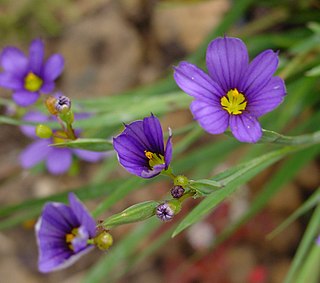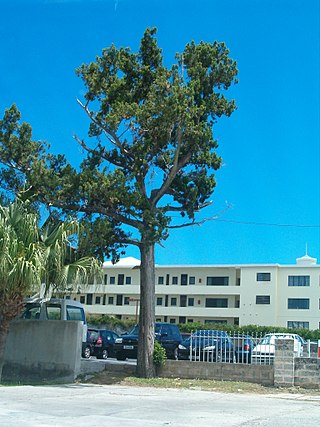
Bermuda is an overseas territory of the United Kingdom in the North Atlantic Ocean. Located off the east coast of the United States, it is situated around 1,770 km (1,100 mi) northeast of Miami, Florida, and 1,350 km (840 mi) south of Halifax, Nova Scotia, west of Portugal, northwest of Brazil, 1,759 km (1,093 mi) north of Havana, Cuba and north-northeast of San Juan, Puerto Rico. The nearest landmass is Cape Hatteras, North Carolina, about 1,030 km (640 mi) west-northwest, followed by Cape Sable Island, Nova Scotia, Canada 1,236 km northward. Although commonly referred to in the singular, the territory consists of approximately 138 islands, with a total area of 57 km2 (22 sq mi).

Iridaceae is a family of plants in order Asparagales, taking its name from the irises. It has a nearly global distribution, with 69 accepted genera with a total of c. 2500 species. It includes a number of economically important cultivated plants, such as species of Freesia, Gladiolus, and Crocus, as well as the crop saffron.

Sisyrinchium is a large genus of annual to perennial flowering plants in the family Iridaceae. Native to the New World, the species are known as blue-eyed grasses. Although they are not true grasses (Poaceae), they are monocots.

Sisyrinchium bellum, the western blue-eyed grass or Californian blue-eyed grass, is the common blue-eyed grass of California and Oregon in and west of the Sierra Nevada, its range extending south into Baja California. In parts of its range, western blue-eyed grass has previously been classified as Sisyrinchium eastwoodiae, S. greenei and S. hesperium, but these names are now considered synonyms.
Bermuda, Islands of Bermuda, or The Somers Isles is an Atlantic archipelago, British Overseas Territory, and a former part of Virginia.

Bermuda's ecology has an abundance of unique flora and fauna due to the island's isolation from the mainland of North America. The wide range of endemic species and the islands form a distinct ecoregion, the Bermuda subtropical conifer forests. The variety of species found both on land and in the waters surrounding Bermuda have varying positive and negative impacts on the ecosystem of the island, depending on the species. There are varying biotic and abiotic factors that have threatened and continue to threaten the island's ecology. There are, however, also means of conservation that can be used to mitigate these threats.

Juniperus bermudiana is a species of juniper endemic to Bermuda. This species is most commonly known as Bermuda cedar, but is also referred to as Bermuda juniper. Historically, this tree formed woodland that covered much of Bermuda. Settlers cleared part of the forest and the tree was used for many purposes including building construction and was especially prized for shipbuilding. Scale insects introduced during the Second World War construction of United States airbases in Bermuda devastated the forests, killing over 99% of the species. Since then, the salt tolerant Casuarina equisetifolia has been planted as a replacement species, and a small number of Bermuda cedars have been found to be resistant to the scale insects. Populations of certain endemic birds which had co-evolved with the tree have plummeted as a result of its demise, while endemic cigalas and solitary bees were driven to extinction.

Chiococca alba is a species of flowering plant in the coffee family (Rubiaceae) native to Florida and the extreme southern tip of Texas in the United States, Bermuda, Mexico, Central America, the Caribbean, the Galápagos, and tropical South America. Common names include David's milkberry, West Indian milkberry, cahinca and West Indian snowberry. The specific epithet, alba, means "white" in Latin and refers to the color of its fruits.

Drumbegger is a townland situated in County Fermanagh, Fermanagh and Omagh district, Northern Ireland. It is part of the civil parish of Boho in the old barony of Magheraboy and contains the sub-townland known as Oubarraghan.

Sisyrinchium californicum is a species of flowering plant in the iris family known by the common names golden blue-eyed grass, yellow-eyed-grass, and golden-eyed-grass. It is native to the west coast of North America from British Columbia to central California, where it grows in moist habitat, often in coastal areas.
Sarah "Sally" Bassett, also known as Sary, was an enslaved African woman from Bermuda. She was declared guilty and burned at the stake in June 1730 for the poisoning of three individuals. Her notoriety has influenced Bermudian history and cultural heritage.

Sisyrinchium micranthum, commonly known as annual blue-eyed grass,blue pigroot, fairy stars, and striped rush-leaf, is a wildflower. It is a grass-like species in the iris family, Iridaceae. It is native to Mexico, Central America, and South America and widely naturalized elsewhere. The flowers are between 10 and 20 mm in diameter. Often the flowers are white with blue to purple centers, but may bloom in other colors such as yellow, pink, or violet. These are followed by rounded 3 to 8 mm brown capsules that enclose the dark brown seeds.
Sisyrinchium sarmentosum is a species of flowering plant in the iris family known by the common names mountain blue-eyed grass and pale blue-eyed-grass. It is native to the Pacific Northwest of North America, where it is known from a part of the Cascade Mountains in Washington and Oregon.
Pencil cedar may refer to any of several species of tree in the families Araliaceae and Cupressaceae:

Olsynium filifolium , or Bermudiana filifolia, is the only species of the iris family native to the Falkland Islands. It is much better known by its former name Sisyrinchium filifolium. Although it is no longer as common as it once was, it is widely distributed on the islands, and favours temperate dwarf shrub heath. It is also found in Patagonia.

Sisyrinchium bermudiana, known as Bermudiana or, along with other members of the genus, as blue-eyed grass, is a flower of the genus Sisyrinchium that is native to the Atlantic archipelago, and British Overseas Territory, of Bermuda and the island of Ireland. The plant appears and blooms in the spring. It has been used as a totemic flower by Bermudians, and appears in art, jewellery, banknotes and elsewhere.
White-eyed grass is a common name for at least two species of plants:

Furness Bermuda Line new service to Bermuda in the 1920s created the need of additional modern accommodations for the tourists coming to the island after the first World War. This lead for Furness Withy, parent company of the line, to begin buying existing hotels and purchasing land for this new demand. This led to the formation of the Bermuda Development Company which would Furness' new business development. Eventually the company would manage four main properties: The St George, The Mid Ocean Club, Bermudiana, and the Castle Harbor Hotel. The hotels would continue to see increased business and benefit from legislation passed that would prevent ships from being used as hotels in 1938. Furness Withy would eventually sell all its ownership in the hotels by 1958.

Sisyrinchium pallidum, more commonly known as pale blue-eyed grass, is a species of blue-eyed grass in the iris family. It is a small plant that lacks woody parts and grows in constantly wet meadows and fens in the mountains of Colorado and Wyoming. It is a rare species and is vulnerable to development of its required habitat type.











